Examining Intergenerational Support in Modern Families
VerifiedAdded on 2020/05/08
|15
|3697
|49
AI Summary
The transition from adolescence to adulthood is a complex process influenced by various factors, including familial support. This assignment delves into the nature and implications of intergenerational support, particularly financial assistance provided by parents to their adult children. Drawing on research literature, it examines how this support affects young adults' independence, relationship quality with parents, and overall well-being. The analysis considers both Western and non-Western contexts, highlighting cultural variations in family norms and expectations regarding parental roles. Key themes include the balance between providing support and fostering autonomy, the reciprocal nature of parent-child relationships, and the potential long-term effects on family dynamics. By synthesizing findings from multiple studies, this assignment aims to provide a comprehensive understanding of how intergenerational support shapes the transition to adulthood.
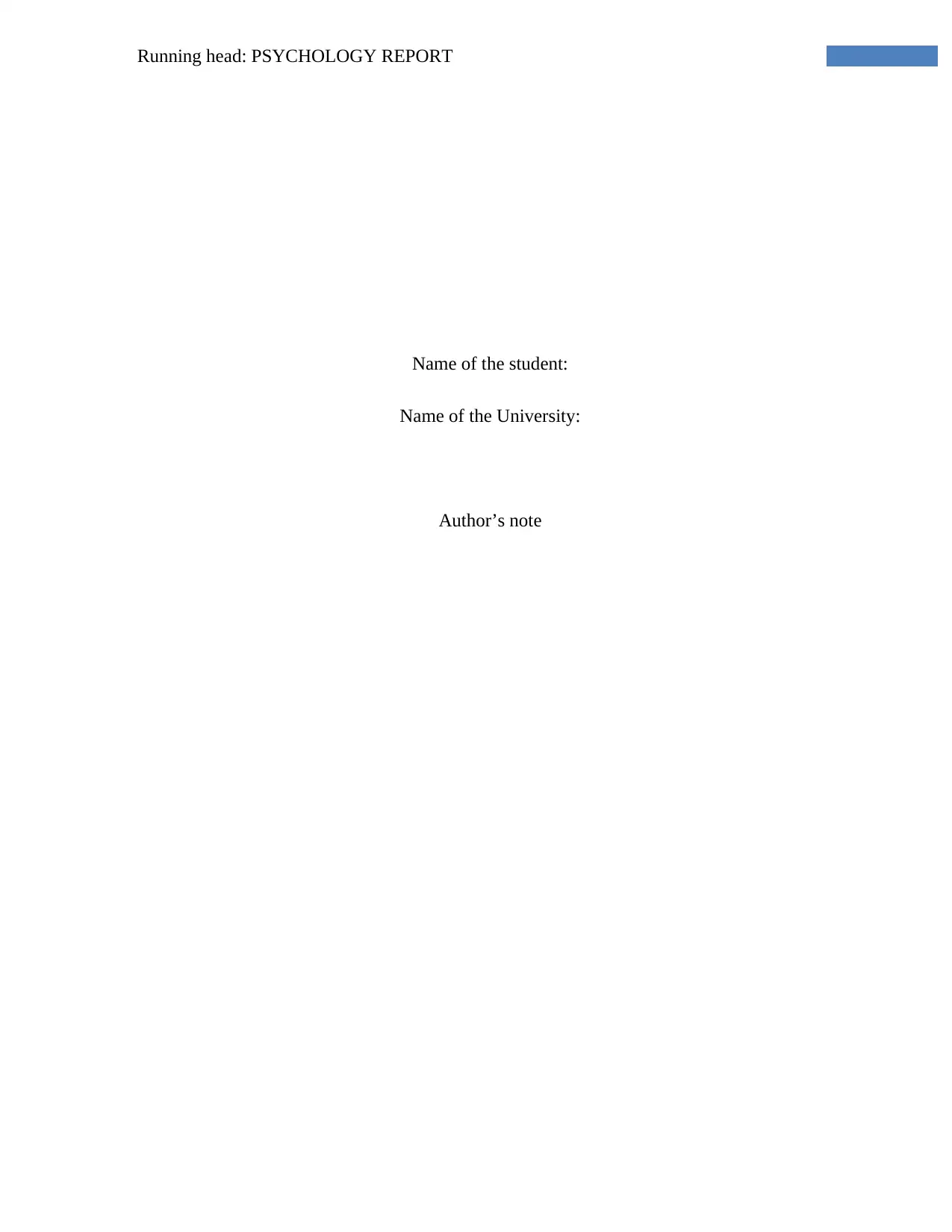
Running head: PSYCHOLOGY REPORT
Name of the student:
Name of the University:
Author’s note
Name of the student:
Name of the University:
Author’s note
Paraphrase This Document
Need a fresh take? Get an instant paraphrase of this document with our AI Paraphraser
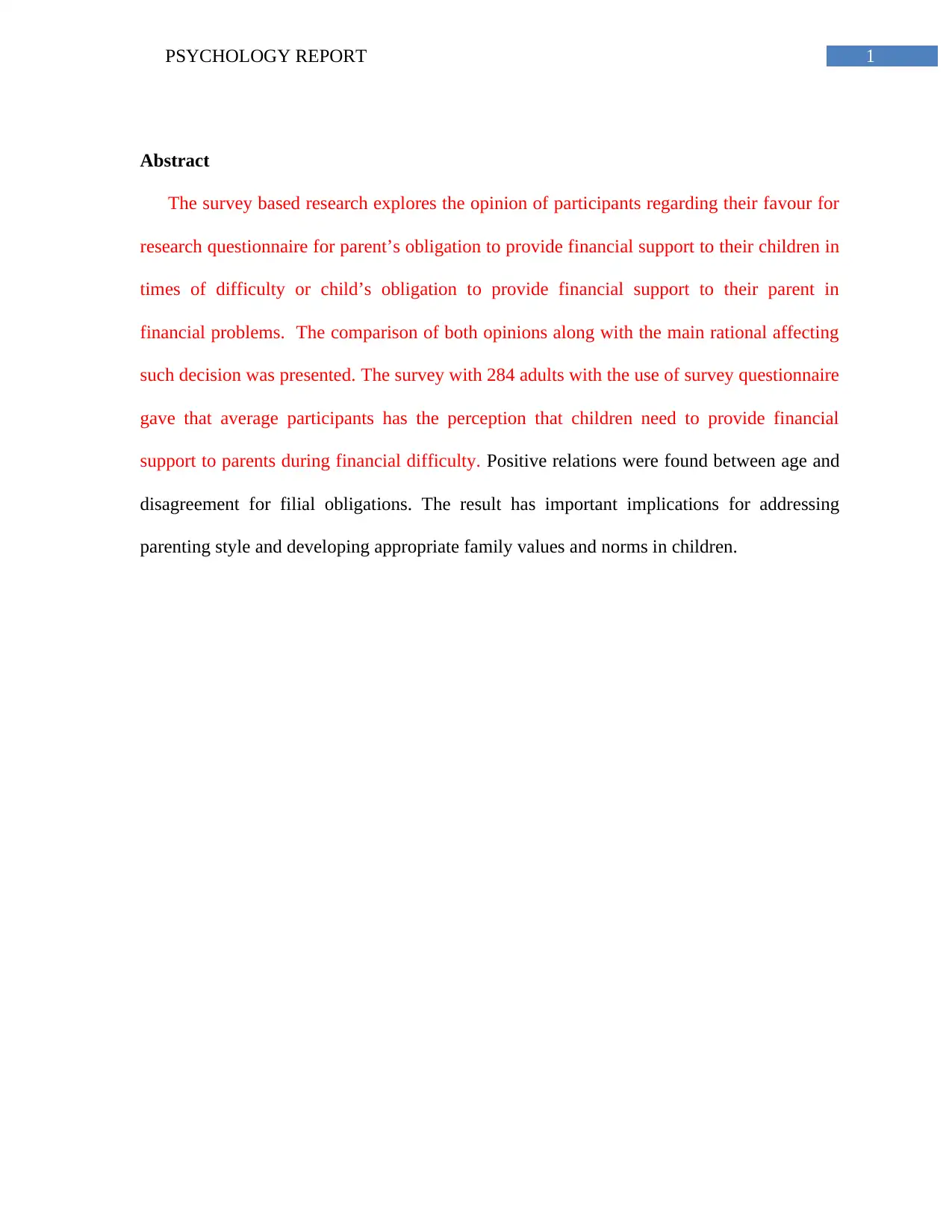
1PSYCHOLOGY REPORT
Abstract
The survey based research explores the opinion of participants regarding their favour for
research questionnaire for parent’s obligation to provide financial support to their children in
times of difficulty or child’s obligation to provide financial support to their parent in
financial problems. The comparison of both opinions along with the main rational affecting
such decision was presented. The survey with 284 adults with the use of survey questionnaire
gave that average participants has the perception that children need to provide financial
support to parents during financial difficulty. Positive relations were found between age and
disagreement for filial obligations. The result has important implications for addressing
parenting style and developing appropriate family values and norms in children.
Abstract
The survey based research explores the opinion of participants regarding their favour for
research questionnaire for parent’s obligation to provide financial support to their children in
times of difficulty or child’s obligation to provide financial support to their parent in
financial problems. The comparison of both opinions along with the main rational affecting
such decision was presented. The survey with 284 adults with the use of survey questionnaire
gave that average participants has the perception that children need to provide financial
support to parents during financial difficulty. Positive relations were found between age and
disagreement for filial obligations. The result has important implications for addressing
parenting style and developing appropriate family values and norms in children.
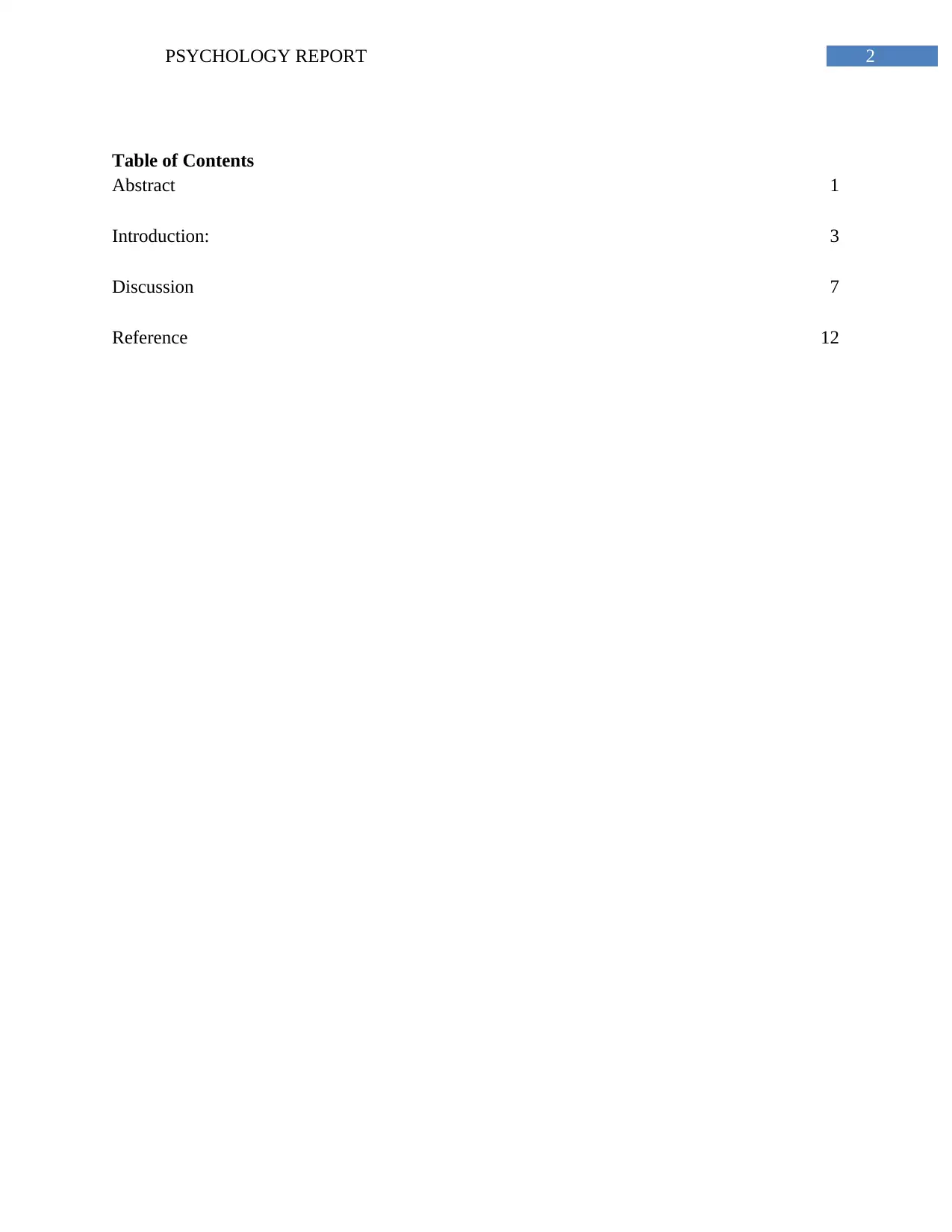
2PSYCHOLOGY REPORT
Table of Contents
Abstract 1
Introduction: 3
Discussion 7
Reference 12
Table of Contents
Abstract 1
Introduction: 3
Discussion 7
Reference 12
⊘ This is a preview!⊘
Do you want full access?
Subscribe today to unlock all pages.

Trusted by 1+ million students worldwide
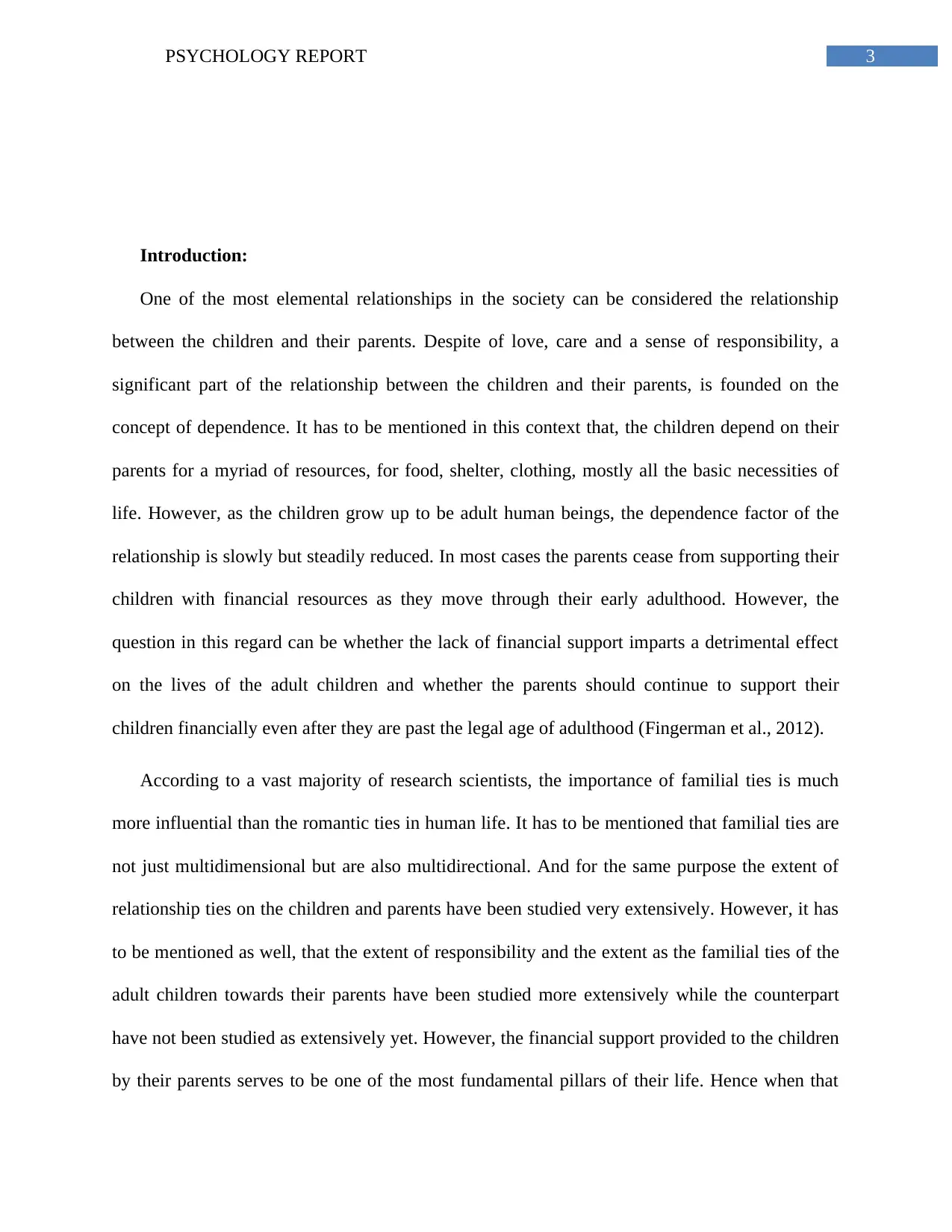
3PSYCHOLOGY REPORT
Introduction:
One of the most elemental relationships in the society can be considered the relationship
between the children and their parents. Despite of love, care and a sense of responsibility, a
significant part of the relationship between the children and their parents, is founded on the
concept of dependence. It has to be mentioned in this context that, the children depend on their
parents for a myriad of resources, for food, shelter, clothing, mostly all the basic necessities of
life. However, as the children grow up to be adult human beings, the dependence factor of the
relationship is slowly but steadily reduced. In most cases the parents cease from supporting their
children with financial resources as they move through their early adulthood. However, the
question in this regard can be whether the lack of financial support imparts a detrimental effect
on the lives of the adult children and whether the parents should continue to support their
children financially even after they are past the legal age of adulthood (Fingerman et al., 2012).
According to a vast majority of research scientists, the importance of familial ties is much
more influential than the romantic ties in human life. It has to be mentioned that familial ties are
not just multidimensional but are also multidirectional. And for the same purpose the extent of
relationship ties on the children and parents have been studied very extensively. However, it has
to be mentioned as well, that the extent of responsibility and the extent as the familial ties of the
adult children towards their parents have been studied more extensively while the counterpart
have not been studied as extensively yet. However, the financial support provided to the children
by their parents serves to be one of the most fundamental pillars of their life. Hence when that
Introduction:
One of the most elemental relationships in the society can be considered the relationship
between the children and their parents. Despite of love, care and a sense of responsibility, a
significant part of the relationship between the children and their parents, is founded on the
concept of dependence. It has to be mentioned in this context that, the children depend on their
parents for a myriad of resources, for food, shelter, clothing, mostly all the basic necessities of
life. However, as the children grow up to be adult human beings, the dependence factor of the
relationship is slowly but steadily reduced. In most cases the parents cease from supporting their
children with financial resources as they move through their early adulthood. However, the
question in this regard can be whether the lack of financial support imparts a detrimental effect
on the lives of the adult children and whether the parents should continue to support their
children financially even after they are past the legal age of adulthood (Fingerman et al., 2012).
According to a vast majority of research scientists, the importance of familial ties is much
more influential than the romantic ties in human life. It has to be mentioned that familial ties are
not just multidimensional but are also multidirectional. And for the same purpose the extent of
relationship ties on the children and parents have been studied very extensively. However, it has
to be mentioned as well, that the extent of responsibility and the extent as the familial ties of the
adult children towards their parents have been studied more extensively while the counterpart
have not been studied as extensively yet. However, the financial support provided to the children
by their parents serves to be one of the most fundamental pillars of their life. Hence when that
Paraphrase This Document
Need a fresh take? Get an instant paraphrase of this document with our AI Paraphraser
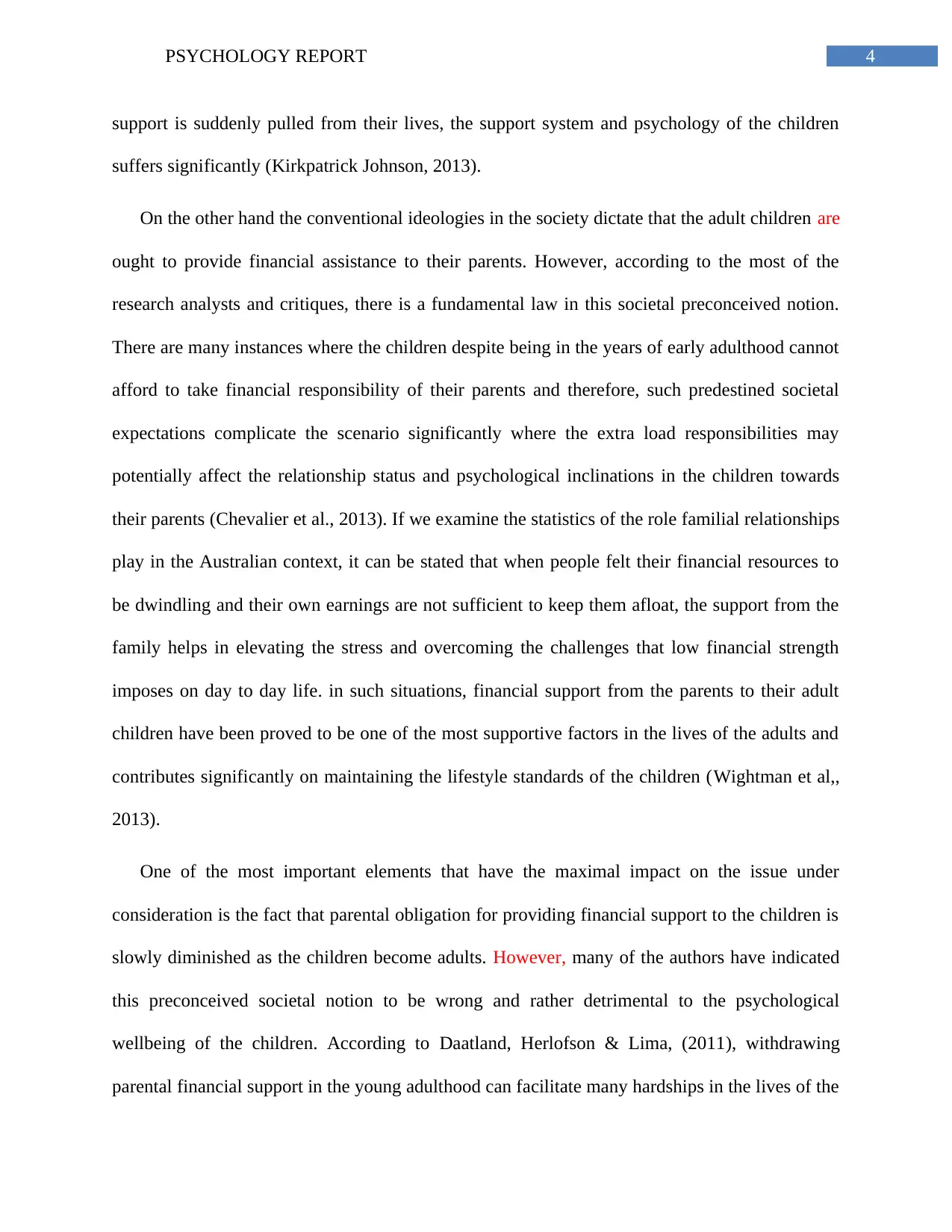
4PSYCHOLOGY REPORT
support is suddenly pulled from their lives, the support system and psychology of the children
suffers significantly (Kirkpatrick Johnson, 2013).
On the other hand the conventional ideologies in the society dictate that the adult children are
ought to provide financial assistance to their parents. However, according to the most of the
research analysts and critiques, there is a fundamental law in this societal preconceived notion.
There are many instances where the children despite being in the years of early adulthood cannot
afford to take financial responsibility of their parents and therefore, such predestined societal
expectations complicate the scenario significantly where the extra load responsibilities may
potentially affect the relationship status and psychological inclinations in the children towards
their parents (Chevalier et al., 2013). If we examine the statistics of the role familial relationships
play in the Australian context, it can be stated that when people felt their financial resources to
be dwindling and their own earnings are not sufficient to keep them afloat, the support from the
family helps in elevating the stress and overcoming the challenges that low financial strength
imposes on day to day life. in such situations, financial support from the parents to their adult
children have been proved to be one of the most supportive factors in the lives of the adults and
contributes significantly on maintaining the lifestyle standards of the children (Wightman et al,,
2013).
One of the most important elements that have the maximal impact on the issue under
consideration is the fact that parental obligation for providing financial support to the children is
slowly diminished as the children become adults. However, many of the authors have indicated
this preconceived societal notion to be wrong and rather detrimental to the psychological
wellbeing of the children. According to Daatland, Herlofson & Lima, (2011), withdrawing
parental financial support in the young adulthood can facilitate many hardships in the lives of the
support is suddenly pulled from their lives, the support system and psychology of the children
suffers significantly (Kirkpatrick Johnson, 2013).
On the other hand the conventional ideologies in the society dictate that the adult children are
ought to provide financial assistance to their parents. However, according to the most of the
research analysts and critiques, there is a fundamental law in this societal preconceived notion.
There are many instances where the children despite being in the years of early adulthood cannot
afford to take financial responsibility of their parents and therefore, such predestined societal
expectations complicate the scenario significantly where the extra load responsibilities may
potentially affect the relationship status and psychological inclinations in the children towards
their parents (Chevalier et al., 2013). If we examine the statistics of the role familial relationships
play in the Australian context, it can be stated that when people felt their financial resources to
be dwindling and their own earnings are not sufficient to keep them afloat, the support from the
family helps in elevating the stress and overcoming the challenges that low financial strength
imposes on day to day life. in such situations, financial support from the parents to their adult
children have been proved to be one of the most supportive factors in the lives of the adults and
contributes significantly on maintaining the lifestyle standards of the children (Wightman et al,,
2013).
One of the most important elements that have the maximal impact on the issue under
consideration is the fact that parental obligation for providing financial support to the children is
slowly diminished as the children become adults. However, many of the authors have indicated
this preconceived societal notion to be wrong and rather detrimental to the psychological
wellbeing of the children. According to Daatland, Herlofson & Lima, (2011), withdrawing
parental financial support in the young adulthood can facilitate many hardships in the lives of the
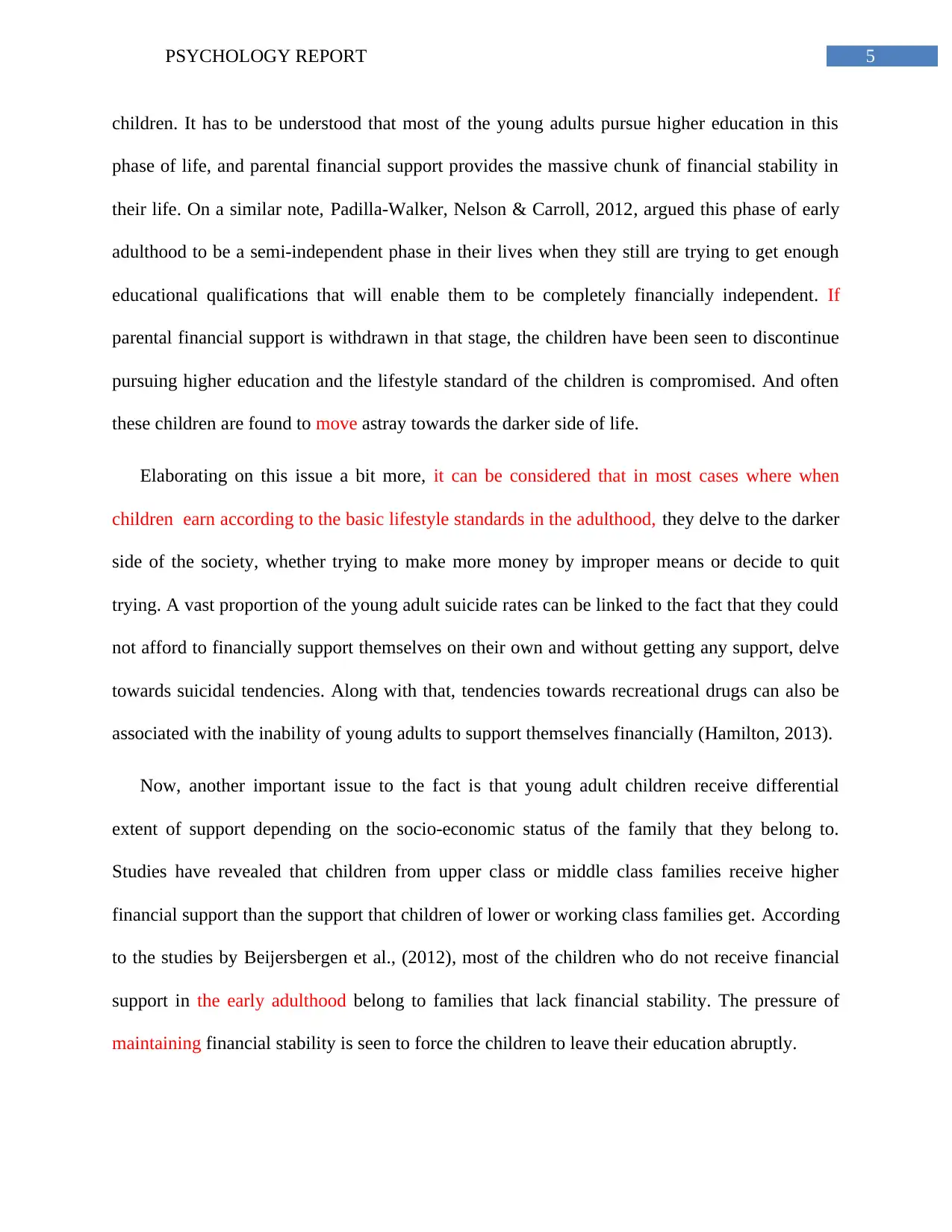
5PSYCHOLOGY REPORT
children. It has to be understood that most of the young adults pursue higher education in this
phase of life, and parental financial support provides the massive chunk of financial stability in
their life. On a similar note, Padilla-Walker, Nelson & Carroll, 2012, argued this phase of early
adulthood to be a semi-independent phase in their lives when they still are trying to get enough
educational qualifications that will enable them to be completely financially independent. If
parental financial support is withdrawn in that stage, the children have been seen to discontinue
pursuing higher education and the lifestyle standard of the children is compromised. And often
these children are found to move astray towards the darker side of life.
Elaborating on this issue a bit more, it can be considered that in most cases where when
children earn according to the basic lifestyle standards in the adulthood, they delve to the darker
side of the society, whether trying to make more money by improper means or decide to quit
trying. A vast proportion of the young adult suicide rates can be linked to the fact that they could
not afford to financially support themselves on their own and without getting any support, delve
towards suicidal tendencies. Along with that, tendencies towards recreational drugs can also be
associated with the inability of young adults to support themselves financially (Hamilton, 2013).
Now, another important issue to the fact is that young adult children receive differential
extent of support depending on the socio-economic status of the family that they belong to.
Studies have revealed that children from upper class or middle class families receive higher
financial support than the support that children of lower or working class families get. According
to the studies by Beijersbergen et al., (2012), most of the children who do not receive financial
support in the early adulthood belong to families that lack financial stability. The pressure of
maintaining financial stability is seen to force the children to leave their education abruptly.
children. It has to be understood that most of the young adults pursue higher education in this
phase of life, and parental financial support provides the massive chunk of financial stability in
their life. On a similar note, Padilla-Walker, Nelson & Carroll, 2012, argued this phase of early
adulthood to be a semi-independent phase in their lives when they still are trying to get enough
educational qualifications that will enable them to be completely financially independent. If
parental financial support is withdrawn in that stage, the children have been seen to discontinue
pursuing higher education and the lifestyle standard of the children is compromised. And often
these children are found to move astray towards the darker side of life.
Elaborating on this issue a bit more, it can be considered that in most cases where when
children earn according to the basic lifestyle standards in the adulthood, they delve to the darker
side of the society, whether trying to make more money by improper means or decide to quit
trying. A vast proportion of the young adult suicide rates can be linked to the fact that they could
not afford to financially support themselves on their own and without getting any support, delve
towards suicidal tendencies. Along with that, tendencies towards recreational drugs can also be
associated with the inability of young adults to support themselves financially (Hamilton, 2013).
Now, another important issue to the fact is that young adult children receive differential
extent of support depending on the socio-economic status of the family that they belong to.
Studies have revealed that children from upper class or middle class families receive higher
financial support than the support that children of lower or working class families get. According
to the studies by Beijersbergen et al., (2012), most of the children who do not receive financial
support in the early adulthood belong to families that lack financial stability. The pressure of
maintaining financial stability is seen to force the children to leave their education abruptly.
⊘ This is a preview!⊘
Do you want full access?
Subscribe today to unlock all pages.

Trusted by 1+ million students worldwide
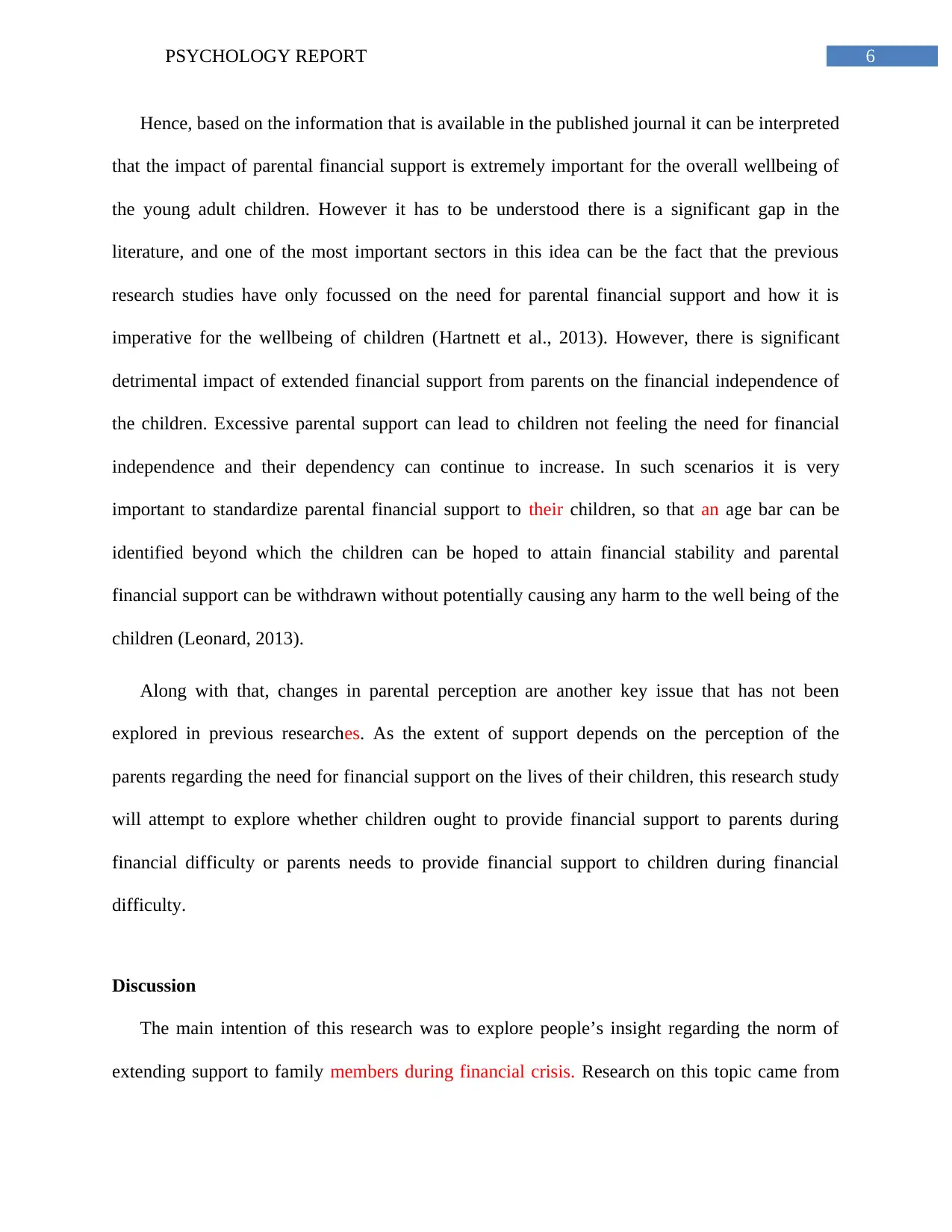
6PSYCHOLOGY REPORT
Hence, based on the information that is available in the published journal it can be interpreted
that the impact of parental financial support is extremely important for the overall wellbeing of
the young adult children. However it has to be understood there is a significant gap in the
literature, and one of the most important sectors in this idea can be the fact that the previous
research studies have only focussed on the need for parental financial support and how it is
imperative for the wellbeing of children (Hartnett et al., 2013). However, there is significant
detrimental impact of extended financial support from parents on the financial independence of
the children. Excessive parental support can lead to children not feeling the need for financial
independence and their dependency can continue to increase. In such scenarios it is very
important to standardize parental financial support to their children, so that an age bar can be
identified beyond which the children can be hoped to attain financial stability and parental
financial support can be withdrawn without potentially causing any harm to the well being of the
children (Leonard, 2013).
Along with that, changes in parental perception are another key issue that has not been
explored in previous researches. As the extent of support depends on the perception of the
parents regarding the need for financial support on the lives of their children, this research study
will attempt to explore whether children ought to provide financial support to parents during
financial difficulty or parents needs to provide financial support to children during financial
difficulty.
Discussion
The main intention of this research was to explore people’s insight regarding the norm of
extending support to family members during financial crisis. Research on this topic came from
Hence, based on the information that is available in the published journal it can be interpreted
that the impact of parental financial support is extremely important for the overall wellbeing of
the young adult children. However it has to be understood there is a significant gap in the
literature, and one of the most important sectors in this idea can be the fact that the previous
research studies have only focussed on the need for parental financial support and how it is
imperative for the wellbeing of children (Hartnett et al., 2013). However, there is significant
detrimental impact of extended financial support from parents on the financial independence of
the children. Excessive parental support can lead to children not feeling the need for financial
independence and their dependency can continue to increase. In such scenarios it is very
important to standardize parental financial support to their children, so that an age bar can be
identified beyond which the children can be hoped to attain financial stability and parental
financial support can be withdrawn without potentially causing any harm to the well being of the
children (Leonard, 2013).
Along with that, changes in parental perception are another key issue that has not been
explored in previous researches. As the extent of support depends on the perception of the
parents regarding the need for financial support on the lives of their children, this research study
will attempt to explore whether children ought to provide financial support to parents during
financial difficulty or parents needs to provide financial support to children during financial
difficulty.
Discussion
The main intention of this research was to explore people’s insight regarding the norm of
extending support to family members during financial crisis. Research on this topic came from
Paraphrase This Document
Need a fresh take? Get an instant paraphrase of this document with our AI Paraphraser
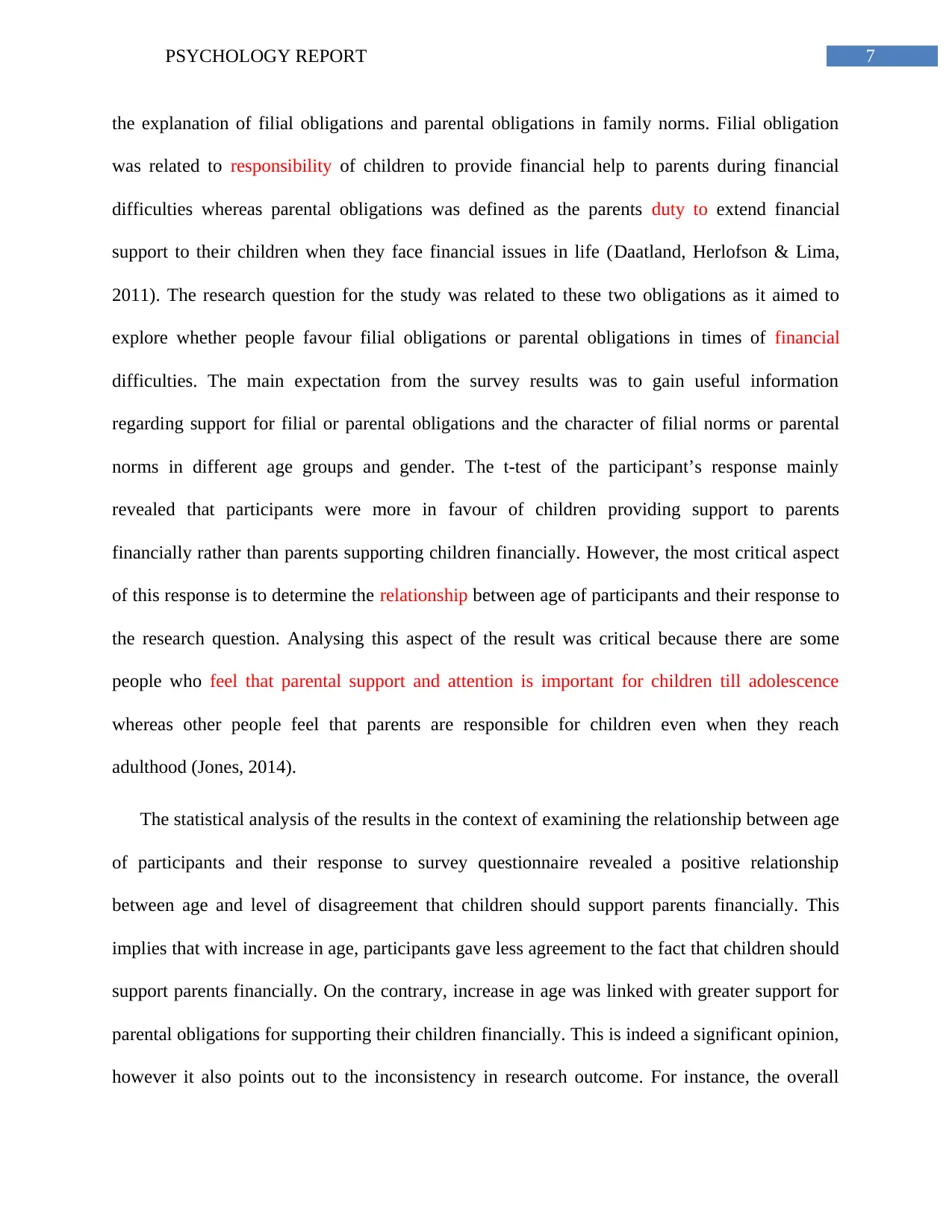
7PSYCHOLOGY REPORT
the explanation of filial obligations and parental obligations in family norms. Filial obligation
was related to responsibility of children to provide financial help to parents during financial
difficulties whereas parental obligations was defined as the parents duty to extend financial
support to their children when they face financial issues in life (Daatland, Herlofson & Lima,
2011). The research question for the study was related to these two obligations as it aimed to
explore whether people favour filial obligations or parental obligations in times of financial
difficulties. The main expectation from the survey results was to gain useful information
regarding support for filial or parental obligations and the character of filial norms or parental
norms in different age groups and gender. The t-test of the participant’s response mainly
revealed that participants were more in favour of children providing support to parents
financially rather than parents supporting children financially. However, the most critical aspect
of this response is to determine the relationship between age of participants and their response to
the research question. Analysing this aspect of the result was critical because there are some
people who feel that parental support and attention is important for children till adolescence
whereas other people feel that parents are responsible for children even when they reach
adulthood (Jones, 2014).
The statistical analysis of the results in the context of examining the relationship between age
of participants and their response to survey questionnaire revealed a positive relationship
between age and level of disagreement that children should support parents financially. This
implies that with increase in age, participants gave less agreement to the fact that children should
support parents financially. On the contrary, increase in age was linked with greater support for
parental obligations for supporting their children financially. This is indeed a significant opinion,
however it also points out to the inconsistency in research outcome. For instance, the overall
the explanation of filial obligations and parental obligations in family norms. Filial obligation
was related to responsibility of children to provide financial help to parents during financial
difficulties whereas parental obligations was defined as the parents duty to extend financial
support to their children when they face financial issues in life (Daatland, Herlofson & Lima,
2011). The research question for the study was related to these two obligations as it aimed to
explore whether people favour filial obligations or parental obligations in times of financial
difficulties. The main expectation from the survey results was to gain useful information
regarding support for filial or parental obligations and the character of filial norms or parental
norms in different age groups and gender. The t-test of the participant’s response mainly
revealed that participants were more in favour of children providing support to parents
financially rather than parents supporting children financially. However, the most critical aspect
of this response is to determine the relationship between age of participants and their response to
the research question. Analysing this aspect of the result was critical because there are some
people who feel that parental support and attention is important for children till adolescence
whereas other people feel that parents are responsible for children even when they reach
adulthood (Jones, 2014).
The statistical analysis of the results in the context of examining the relationship between age
of participants and their response to survey questionnaire revealed a positive relationship
between age and level of disagreement that children should support parents financially. This
implies that with increase in age, participants gave less agreement to the fact that children should
support parents financially. On the contrary, increase in age was linked with greater support for
parental obligations for supporting their children financially. This is indeed a significant opinion,
however it also points out to the inconsistency in research outcome. For instance, the overall
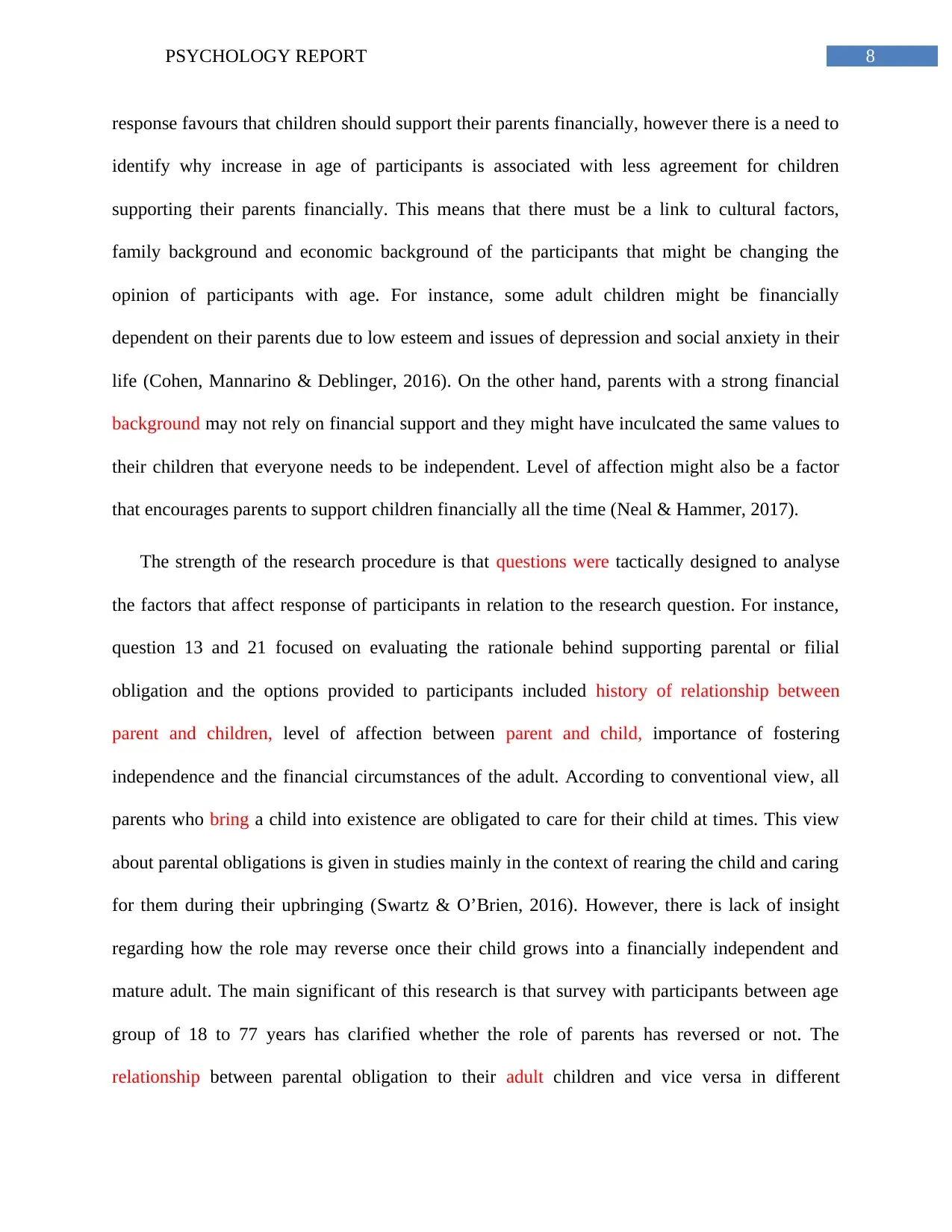
8PSYCHOLOGY REPORT
response favours that children should support their parents financially, however there is a need to
identify why increase in age of participants is associated with less agreement for children
supporting their parents financially. This means that there must be a link to cultural factors,
family background and economic background of the participants that might be changing the
opinion of participants with age. For instance, some adult children might be financially
dependent on their parents due to low esteem and issues of depression and social anxiety in their
life (Cohen, Mannarino & Deblinger, 2016). On the other hand, parents with a strong financial
background may not rely on financial support and they might have inculcated the same values to
their children that everyone needs to be independent. Level of affection might also be a factor
that encourages parents to support children financially all the time (Neal & Hammer, 2017).
The strength of the research procedure is that questions were tactically designed to analyse
the factors that affect response of participants in relation to the research question. For instance,
question 13 and 21 focused on evaluating the rationale behind supporting parental or filial
obligation and the options provided to participants included history of relationship between
parent and children, level of affection between parent and child, importance of fostering
independence and the financial circumstances of the adult. According to conventional view, all
parents who bring a child into existence are obligated to care for their child at times. This view
about parental obligations is given in studies mainly in the context of rearing the child and caring
for them during their upbringing (Swartz & O’Brien, 2016). However, there is lack of insight
regarding how the role may reverse once their child grows into a financially independent and
mature adult. The main significant of this research is that survey with participants between age
group of 18 to 77 years has clarified whether the role of parents has reversed or not. The
relationship between parental obligation to their adult children and vice versa in different
response favours that children should support their parents financially, however there is a need to
identify why increase in age of participants is associated with less agreement for children
supporting their parents financially. This means that there must be a link to cultural factors,
family background and economic background of the participants that might be changing the
opinion of participants with age. For instance, some adult children might be financially
dependent on their parents due to low esteem and issues of depression and social anxiety in their
life (Cohen, Mannarino & Deblinger, 2016). On the other hand, parents with a strong financial
background may not rely on financial support and they might have inculcated the same values to
their children that everyone needs to be independent. Level of affection might also be a factor
that encourages parents to support children financially all the time (Neal & Hammer, 2017).
The strength of the research procedure is that questions were tactically designed to analyse
the factors that affect response of participants in relation to the research question. For instance,
question 13 and 21 focused on evaluating the rationale behind supporting parental or filial
obligation and the options provided to participants included history of relationship between
parent and children, level of affection between parent and child, importance of fostering
independence and the financial circumstances of the adult. According to conventional view, all
parents who bring a child into existence are obligated to care for their child at times. This view
about parental obligations is given in studies mainly in the context of rearing the child and caring
for them during their upbringing (Swartz & O’Brien, 2016). However, there is lack of insight
regarding how the role may reverse once their child grows into a financially independent and
mature adult. The main significant of this research is that survey with participants between age
group of 18 to 77 years has clarified whether the role of parents has reversed or not. The
relationship between parental obligation to their adult children and vice versa in different
⊘ This is a preview!⊘
Do you want full access?
Subscribe today to unlock all pages.

Trusted by 1+ million students worldwide
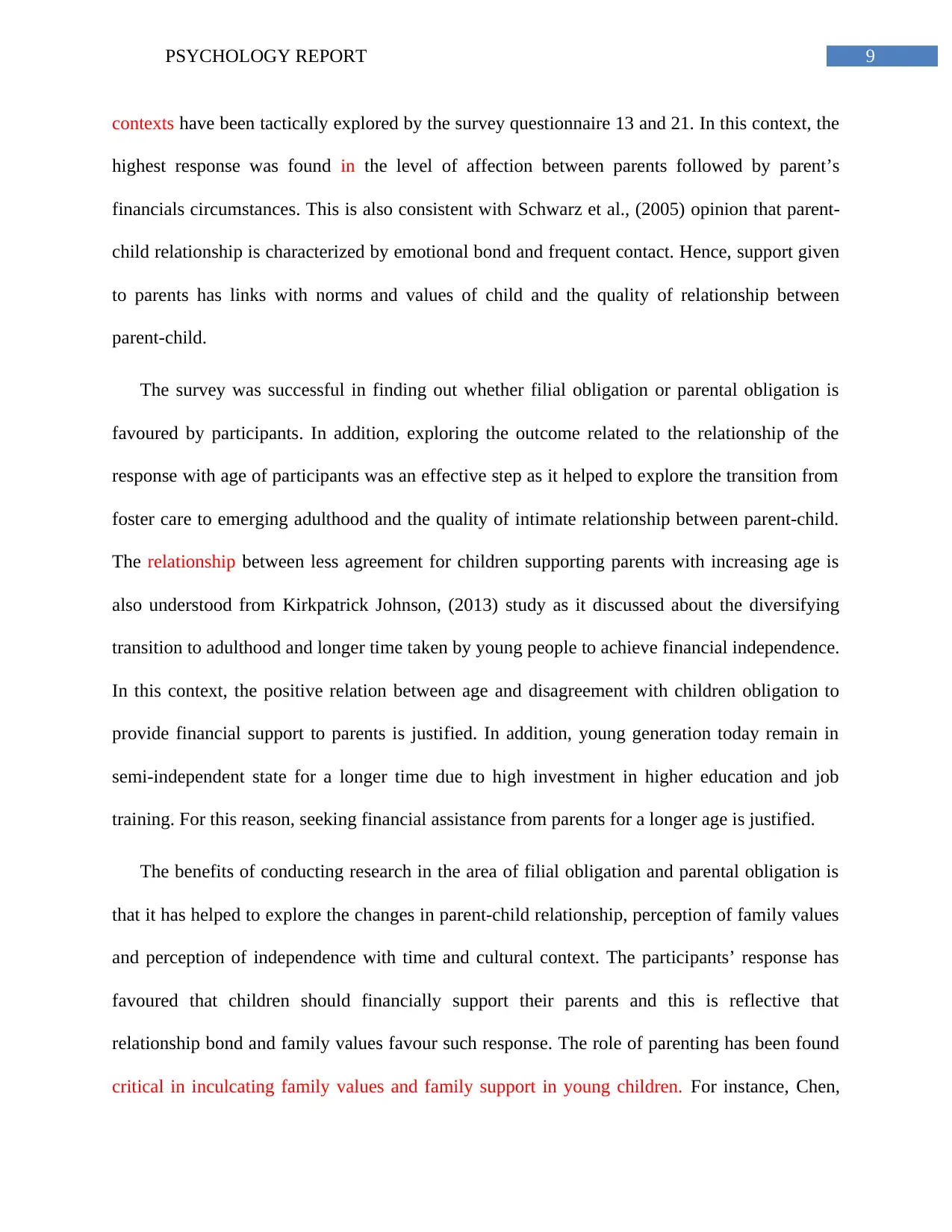
9PSYCHOLOGY REPORT
contexts have been tactically explored by the survey questionnaire 13 and 21. In this context, the
highest response was found in the level of affection between parents followed by parent’s
financials circumstances. This is also consistent with Schwarz et al., (2005) opinion that parent-
child relationship is characterized by emotional bond and frequent contact. Hence, support given
to parents has links with norms and values of child and the quality of relationship between
parent-child.
The survey was successful in finding out whether filial obligation or parental obligation is
favoured by participants. In addition, exploring the outcome related to the relationship of the
response with age of participants was an effective step as it helped to explore the transition from
foster care to emerging adulthood and the quality of intimate relationship between parent-child.
The relationship between less agreement for children supporting parents with increasing age is
also understood from Kirkpatrick Johnson, (2013) study as it discussed about the diversifying
transition to adulthood and longer time taken by young people to achieve financial independence.
In this context, the positive relation between age and disagreement with children obligation to
provide financial support to parents is justified. In addition, young generation today remain in
semi-independent state for a longer time due to high investment in higher education and job
training. For this reason, seeking financial assistance from parents for a longer age is justified.
The benefits of conducting research in the area of filial obligation and parental obligation is
that it has helped to explore the changes in parent-child relationship, perception of family values
and perception of independence with time and cultural context. The participants’ response has
favoured that children should financially support their parents and this is reflective that
relationship bond and family values favour such response. The role of parenting has been found
critical in inculcating family values and family support in young children. For instance, Chen,
contexts have been tactically explored by the survey questionnaire 13 and 21. In this context, the
highest response was found in the level of affection between parents followed by parent’s
financials circumstances. This is also consistent with Schwarz et al., (2005) opinion that parent-
child relationship is characterized by emotional bond and frequent contact. Hence, support given
to parents has links with norms and values of child and the quality of relationship between
parent-child.
The survey was successful in finding out whether filial obligation or parental obligation is
favoured by participants. In addition, exploring the outcome related to the relationship of the
response with age of participants was an effective step as it helped to explore the transition from
foster care to emerging adulthood and the quality of intimate relationship between parent-child.
The relationship between less agreement for children supporting parents with increasing age is
also understood from Kirkpatrick Johnson, (2013) study as it discussed about the diversifying
transition to adulthood and longer time taken by young people to achieve financial independence.
In this context, the positive relation between age and disagreement with children obligation to
provide financial support to parents is justified. In addition, young generation today remain in
semi-independent state for a longer time due to high investment in higher education and job
training. For this reason, seeking financial assistance from parents for a longer age is justified.
The benefits of conducting research in the area of filial obligation and parental obligation is
that it has helped to explore the changes in parent-child relationship, perception of family values
and perception of independence with time and cultural context. The participants’ response has
favoured that children should financially support their parents and this is reflective that
relationship bond and family values favour such response. The role of parenting has been found
critical in inculcating family values and family support in young children. For instance, Chen,
Paraphrase This Document
Need a fresh take? Get an instant paraphrase of this document with our AI Paraphraser
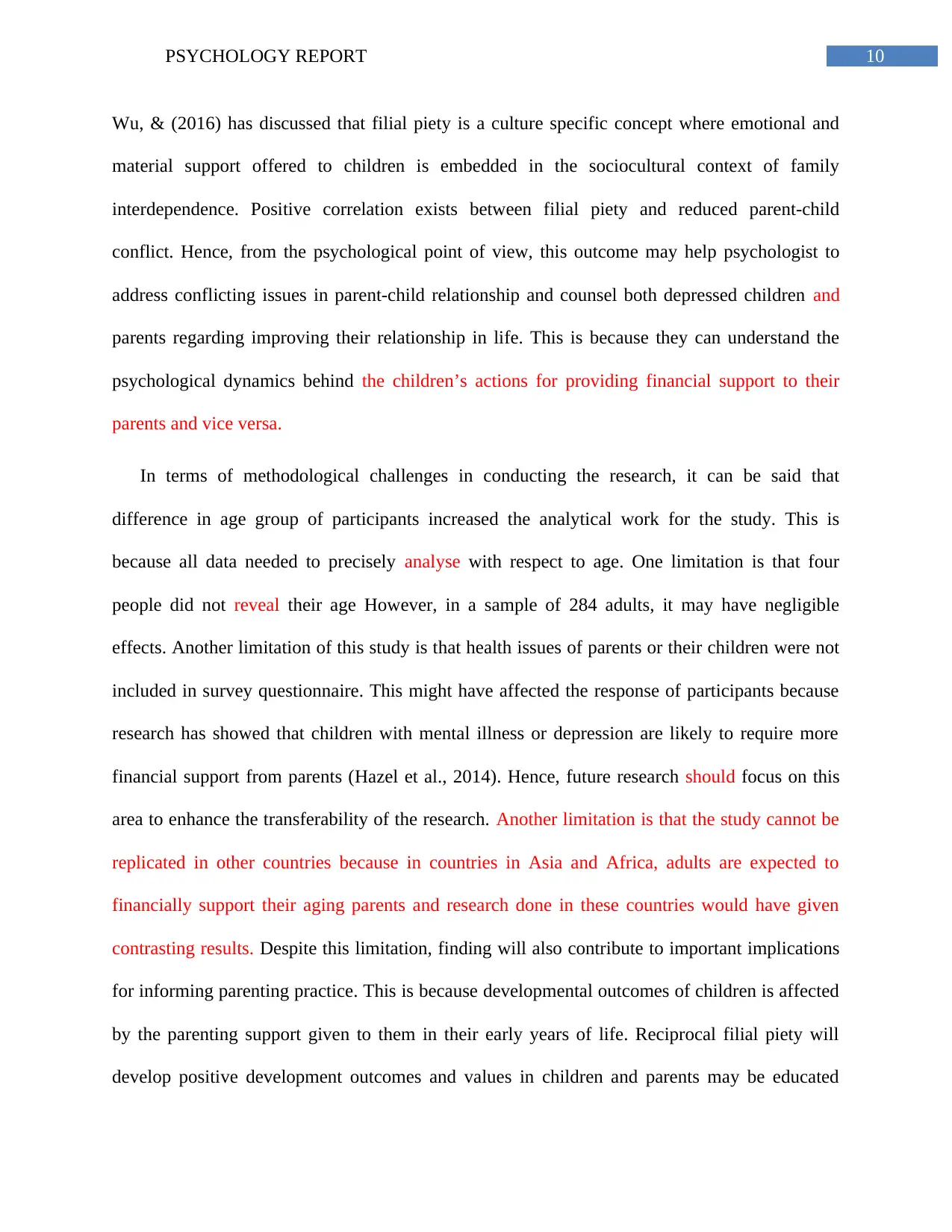
10PSYCHOLOGY REPORT
Wu, & (2016) has discussed that filial piety is a culture specific concept where emotional and
material support offered to children is embedded in the sociocultural context of family
interdependence. Positive correlation exists between filial piety and reduced parent-child
conflict. Hence, from the psychological point of view, this outcome may help psychologist to
address conflicting issues in parent-child relationship and counsel both depressed children and
parents regarding improving their relationship in life. This is because they can understand the
psychological dynamics behind the children’s actions for providing financial support to their
parents and vice versa.
In terms of methodological challenges in conducting the research, it can be said that
difference in age group of participants increased the analytical work for the study. This is
because all data needed to precisely analyse with respect to age. One limitation is that four
people did not reveal their age However, in a sample of 284 adults, it may have negligible
effects. Another limitation of this study is that health issues of parents or their children were not
included in survey questionnaire. This might have affected the response of participants because
research has showed that children with mental illness or depression are likely to require more
financial support from parents (Hazel et al., 2014). Hence, future research should focus on this
area to enhance the transferability of the research. Another limitation is that the study cannot be
replicated in other countries because in countries in Asia and Africa, adults are expected to
financially support their aging parents and research done in these countries would have given
contrasting results. Despite this limitation, finding will also contribute to important implications
for informing parenting practice. This is because developmental outcomes of children is affected
by the parenting support given to them in their early years of life. Reciprocal filial piety will
develop positive development outcomes and values in children and parents may be educated
Wu, & (2016) has discussed that filial piety is a culture specific concept where emotional and
material support offered to children is embedded in the sociocultural context of family
interdependence. Positive correlation exists between filial piety and reduced parent-child
conflict. Hence, from the psychological point of view, this outcome may help psychologist to
address conflicting issues in parent-child relationship and counsel both depressed children and
parents regarding improving their relationship in life. This is because they can understand the
psychological dynamics behind the children’s actions for providing financial support to their
parents and vice versa.
In terms of methodological challenges in conducting the research, it can be said that
difference in age group of participants increased the analytical work for the study. This is
because all data needed to precisely analyse with respect to age. One limitation is that four
people did not reveal their age However, in a sample of 284 adults, it may have negligible
effects. Another limitation of this study is that health issues of parents or their children were not
included in survey questionnaire. This might have affected the response of participants because
research has showed that children with mental illness or depression are likely to require more
financial support from parents (Hazel et al., 2014). Hence, future research should focus on this
area to enhance the transferability of the research. Another limitation is that the study cannot be
replicated in other countries because in countries in Asia and Africa, adults are expected to
financially support their aging parents and research done in these countries would have given
contrasting results. Despite this limitation, finding will also contribute to important implications
for informing parenting practice. This is because developmental outcomes of children is affected
by the parenting support given to them in their early years of life. Reciprocal filial piety will
develop positive development outcomes and values in children and parents may be educated

11PSYCHOLOGY REPORT
about the importance of effective parenting in developing supportive norm and family values in
their children. This is likely to foster positive parent-child relationship
about the importance of effective parenting in developing supportive norm and family values in
their children. This is likely to foster positive parent-child relationship
⊘ This is a preview!⊘
Do you want full access?
Subscribe today to unlock all pages.

Trusted by 1+ million students worldwide
1 out of 15
Related Documents
Your All-in-One AI-Powered Toolkit for Academic Success.
+13062052269
info@desklib.com
Available 24*7 on WhatsApp / Email
![[object Object]](/_next/static/media/star-bottom.7253800d.svg)
Unlock your academic potential
Copyright © 2020–2026 A2Z Services. All Rights Reserved. Developed and managed by ZUCOL.





